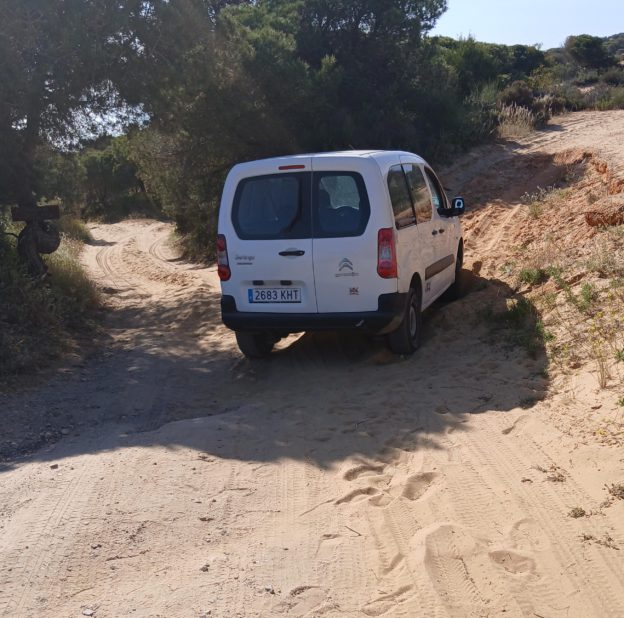[NOTE: Some displayed images are automatically cropped. Click or tap any photo (above the caption) to see it in full screen.
I arrive in Seville Friday evening, my visit timed to match my friends’ non-workdays. I first met Ana, Pola, and teenage daughter Sabina in November 2023. It was a great visit but the family was heavily occupied with work and school so our get acquainted time was quite limited. Ana is a reporter/newscaster for public radio in distant Córdoba. This requires a time consuming commute, 45 minutes each way — when the railroad is running well — 4 days a week. On a 5th day she works from home. Pola is a local television producer and seems to always be on call even when he’s not at the studio.
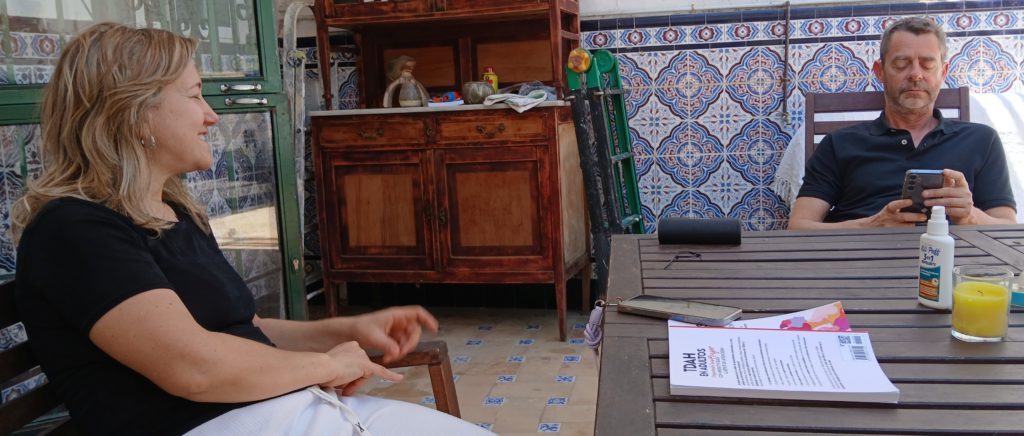
But, this weekend they are both free and, even better, Pola’s rock group is giving an outdoor concert tomorrow, to which I’m looking forward. We spend a few hours getting reacquainted and having dinner until Pola’s old friend, Octavio, arrives from his home in the Canary Islands. In addition to the concert, the Spanish football championship, the Copa del Rey {King’s Cup}, will be decided tomorrow, as well. Ana and family are fans of team Real Madrid, while Octavio roots for opponent FC Barcelona. He has tickets to the game so he’ll see it live.
At about 11 PM, we all head for a neighborhood bar for refreshments, standard Spanish weekend activity. When the bar closes well after midnight, the 4 of us walk home and the evening comes to an end. Saturday morning, Pola heads off after breakfast to prepare for the concert. Anna and I spend the morning talking in her backyard while she cleans the algae and detritus out of their small swimming pool. When my kids were growing up, we had an inground pool and I was terrible at maintenance. One neglected move and the whole thing was a scum pond, requiring tons of expensive chemicals and days of filtration and backflushing to return it to swimming condition. Ana is much more conscientious. Together, we work to get a string of overhead solar lights back in working order. The solar cell has turned upside down and isn’t getting much sunlight.
Ana is applying for a television reporter job here in Seville. Getting it would relieve her of the long daily commute. In addition to interviews, she will have to pass a screen test. It’s a high stakes opportunity to work close to home. We also talk about politics, our grown children and the choices they’ve made, and many other topics, almost all in Spanish. As evening approaches — but with no sign of approaching dark — we drive over to an adjacent town where the concert will begin at 8 PM. Pola’s musical group, AutoReverse, consists of him as bass guitarist and occasional singer, a guitarist, a drummer, and 3, count ’em 3, really good female vocalists. A big crowd has gathered in the park, waiting patiently for the music to begin. When it does, the audience is completely into it. People of all ages are dancing, singing along, and gesticulating. Many of the songs are Spanish with a heavy sprinkling of English lyrics mixed in. It’s rock at its community best. They play about a 2 hour set, with no breaks, with the fans and the band obviously drawing energy from each other. The vocals are dynamite.
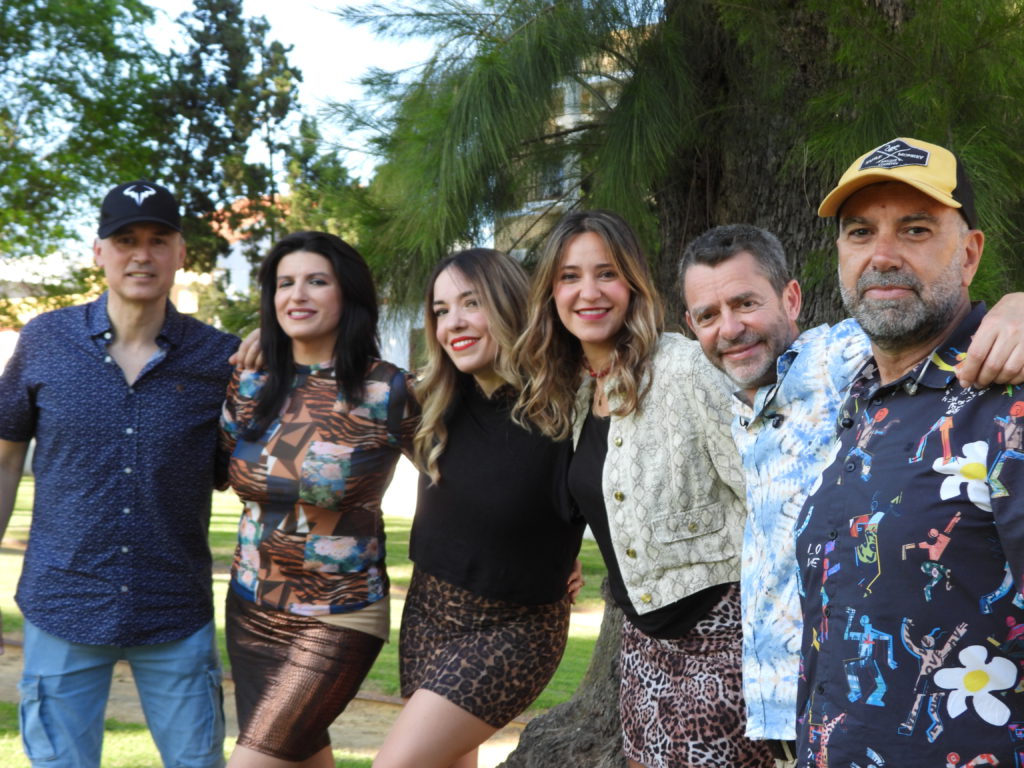
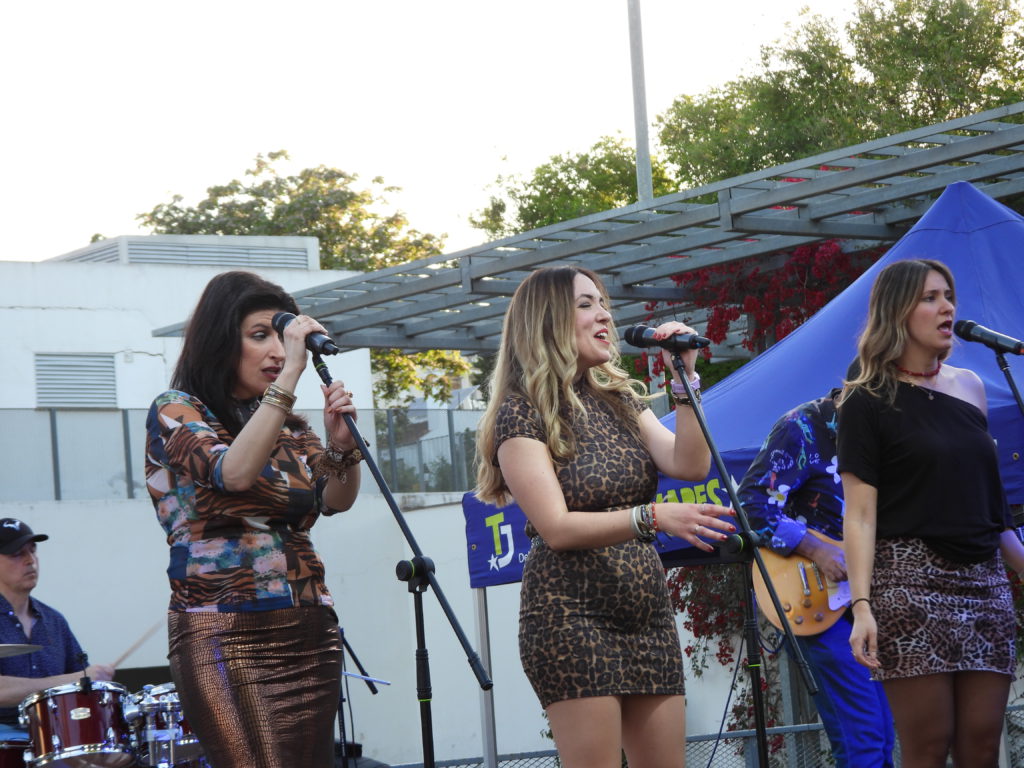
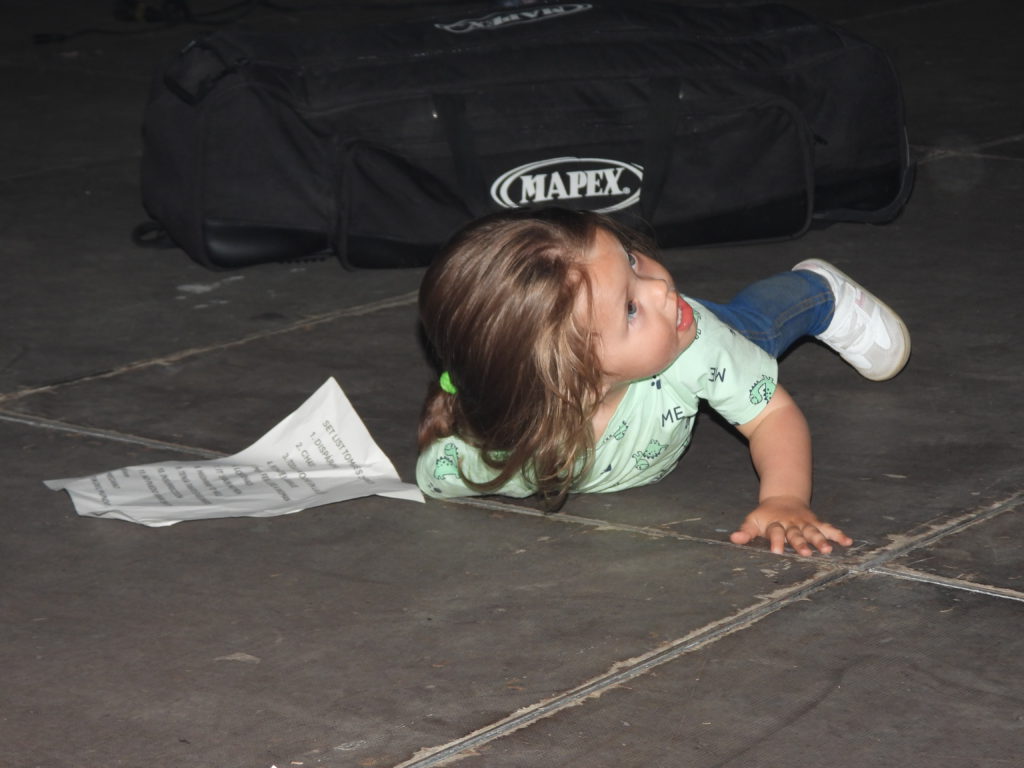
Finally, the show is over — it’s still not completely dark — and it takes an hour or so to break down the set and pack the gear. At the end, we all repair to a nearby bar — the six band members, me, Ana, and the drummer’s wife.
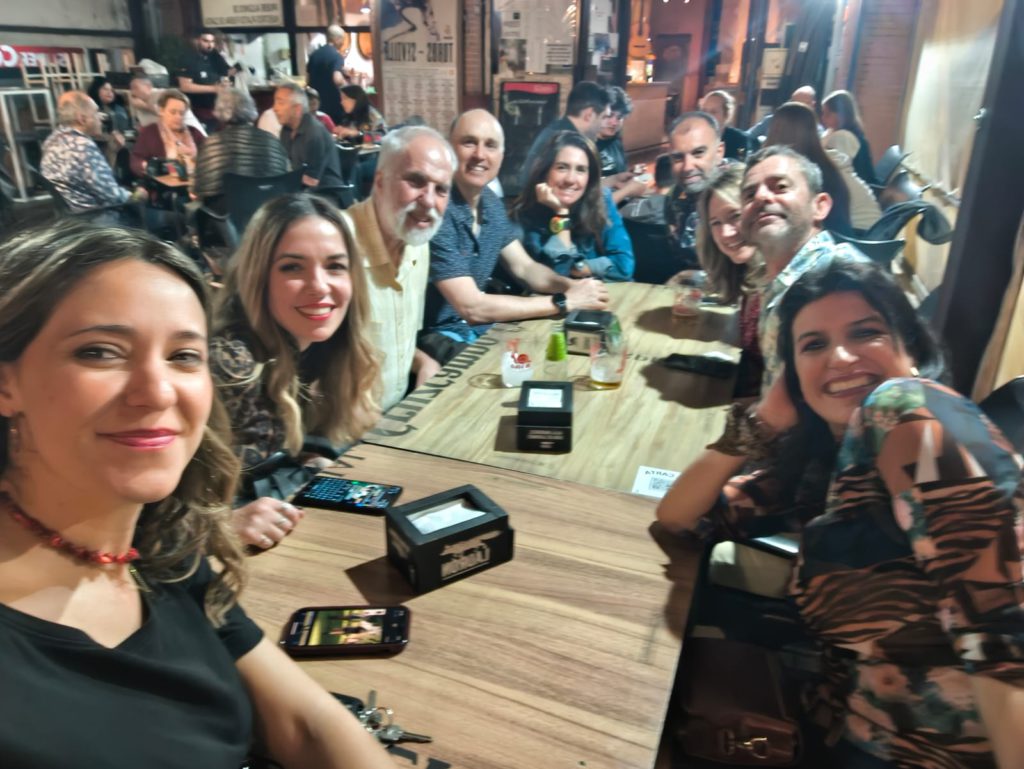
The championship game is in progress and the adjacent bar with big screen tv is full. We sit a few feet away in the next establishment but Ana and Pola are watching on their phone. When something exciting happens, everyone jumps up and shifts a few feet to see the action on television. When we finally disperse to go home, Madrid, the fan favorite in Seville is ahead, but Barcelona later ties the score and, late at night, finally wins the game, breaking many people’s hearts.
Ana has suggested I visit Doñana National Park, a vast forest and wetland along the Atlantic Ocean coast, and I decide to do this. Ana has invited me to stay a third night, so we all spend Sunday lolling around. In early afternoon, I offer to treat them to lunch. Four of us go the same neighborhood bar as Friday night and have excellent food and drink, followed by a long siesta at home.
Toward evening, Ana has to prepare some material for her Monday from-home broadcast, so the night winds down fairly early. I’m planning to be out the door by 6:30 AM Monday morning for the hour drive to the park and I succeed at that task.
Doñana is managed for wildlife, birds, and local agriculture so public access is prohibited in most areas. The main way to see the park is via a motorized concession tour. I’ve been unable to book online, with the website showing no availability. Undaunted, I drive to the park, appearing at the tour headquarters about 30 minutes before the morning departure time, As I hoped, I have no trouble snagging a seat. The price is reasonable at 33€. The tours are conducted on 27-passenger, 4-wheel drive buses. I ask for a guide who speaks English and get Javier, who throughout the tour narrates in Spanish and subsequently translates into English.
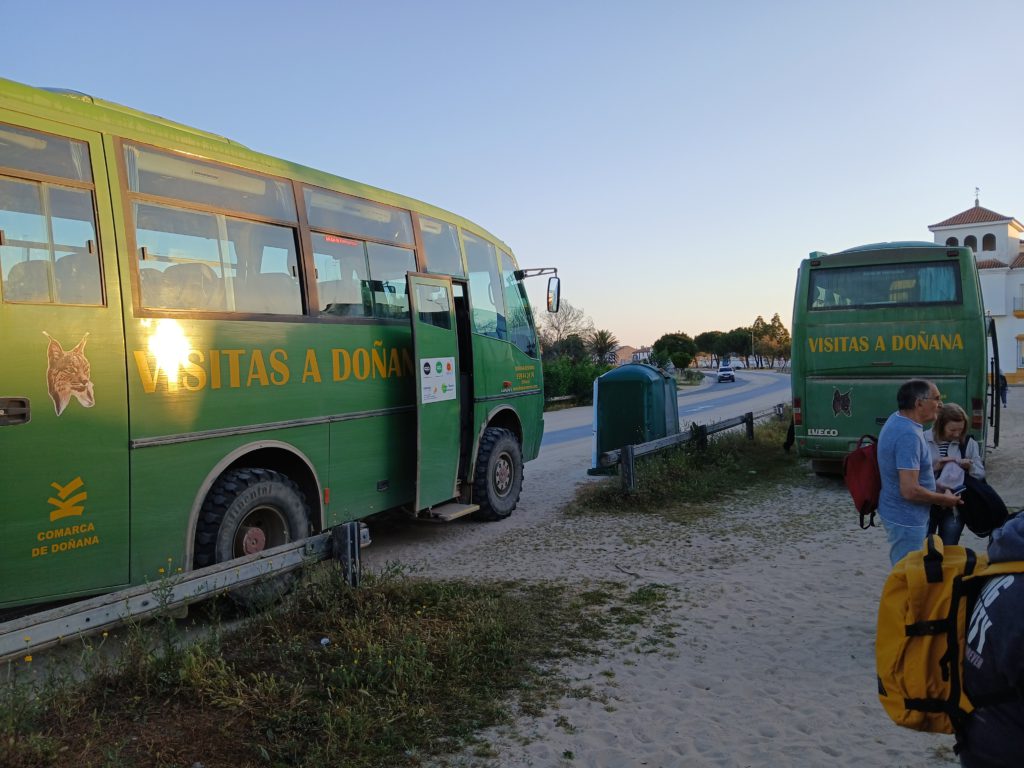
We leave the base and head off through restricted sand roads into the park. We’re seeing birds of various kinds and I’m enthusiastically shooting photos on my large camera. After the first half dozen, I realize something is wrong. As I check, I realize I’ve failed to reinsert the storage card into the camera after my last upload. The card is sitting securely in my laptop, safely back in the car. Stupid, stupid, stupid. In the first locale of the journey where my wildlife camera is really needed, I’m stuck with just my phone, so I have to make do. The bus is ok but not the ideal way to view the wildlife and the environment. In the 3.5 hour tour, we’re only allowed to leave the bus twice. No matter how interesting, we have to observe from inside. There are private tours, more expensive, in smaller vehicles run by the same concessionaire that have the freedom to stop and linger on demand but the bus does an adequate job. The park is managed for both conservation and the local economy. The native trees are cork oaks, which in other areas have their bark peeled every seven years to harvest cork. In Doñana, this is prohibited to allow the trees to grow unhindered.
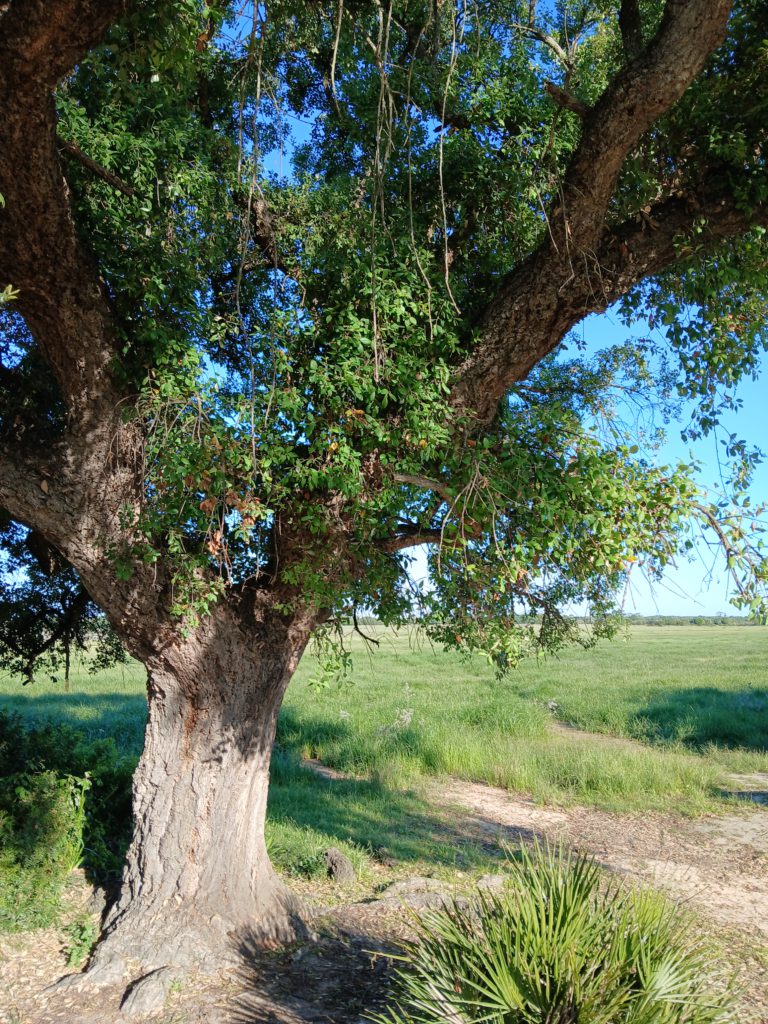
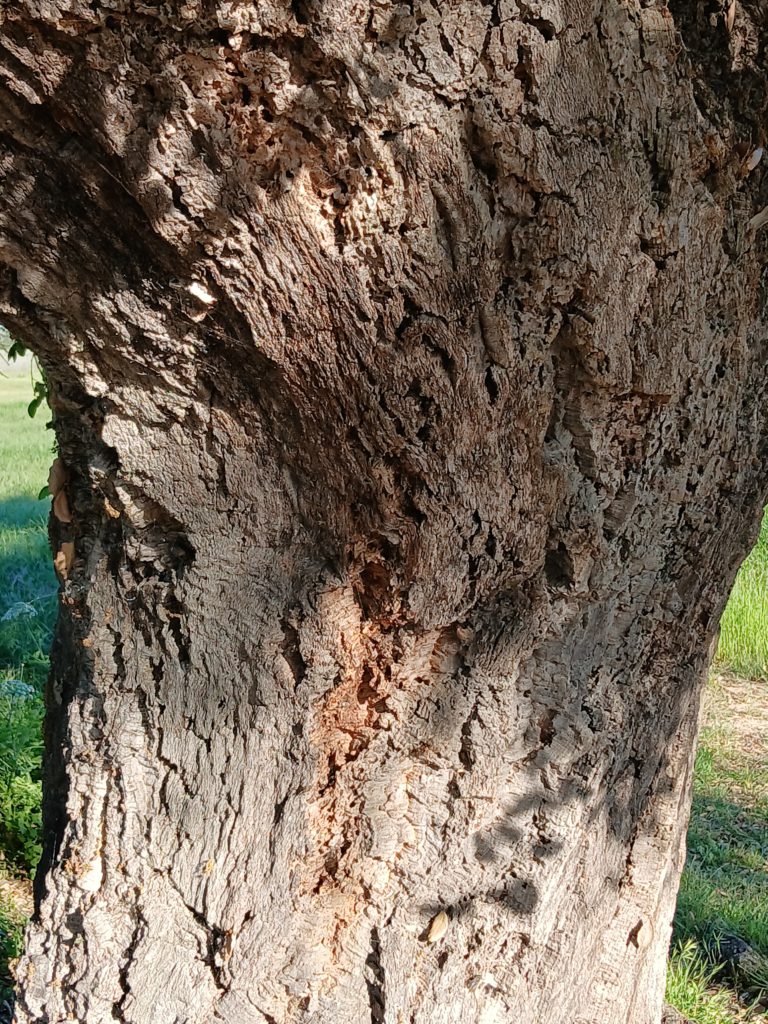
The other major tree in the wooded areas is the umbrella pine, a 300-year invasive that is allowed to persist because its nuts are the only cash forage crop available to the locals.
Adjacent private lands are given over to cattle raising, but when those lands are too wet, as is now the case, the cows are allowed onto drier park land to graze. I don’t know what the balance is between agriculture and preservation, but it seems to work during casual observation. There are many deer, and we see herds of them briefly before the weather gets too hot and they all head for shade and become invisible to us in the bus.
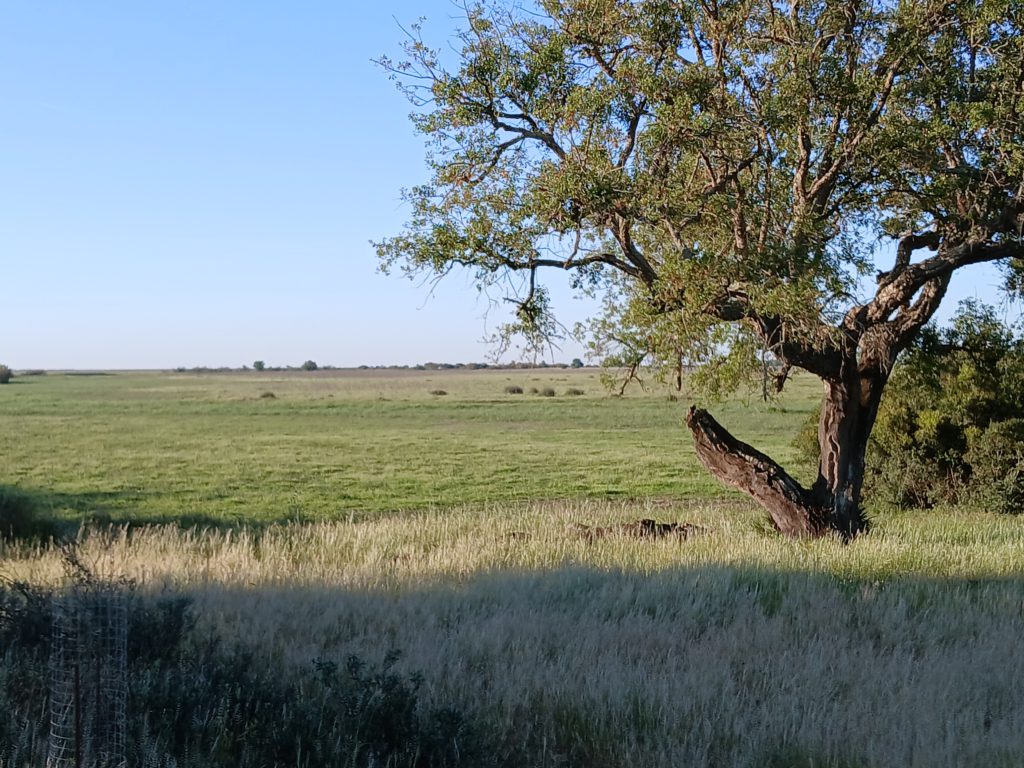
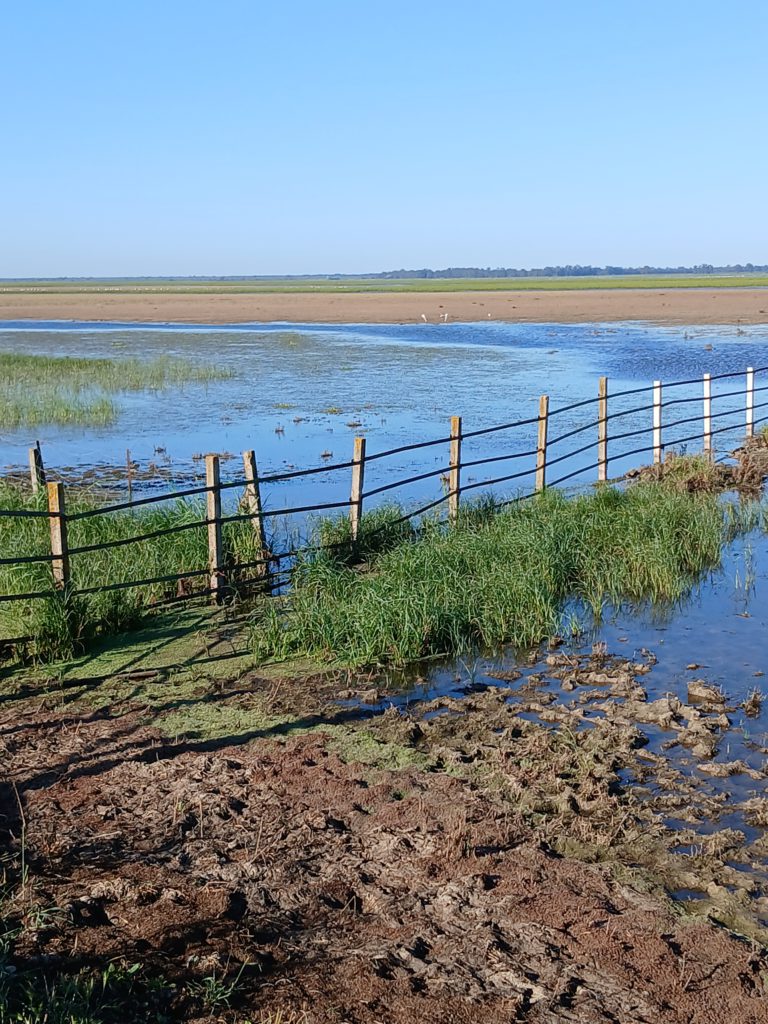
We’ve been seeing a variety of birds throughout: raptors, game birds, and aquatic species including many flamingos (most of which I can’t capture on my phone camera), but at our second stop, a visitor center in an intense wetland, the experience is phenomenal.
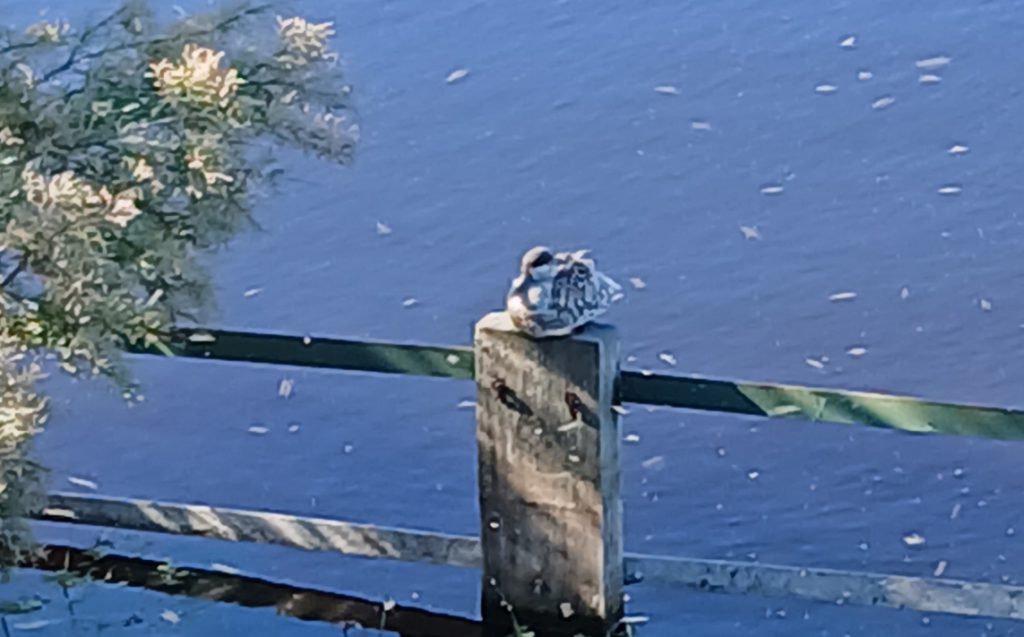

Thousands of birds are nesting wing to wing in the marsh, bushes, and shrubs. From the open observation doors, we see and hear a riot of bird life, Birds are perched and in motion everywhere around us. The noise is deafening at times. The only thing I can compare it to is some of the sea bird nesting rocks in Alaska that can only be viewed from the water, but of course with completely different species.
Javier has advised me where I can explore on my own. There are two unrestricted trails at a second visitor center nearby. With the storage card now back in the camera, I drive over there and walk one of the boardwalks, but the sun is out, shade is sparse, and in the midday heat, the birds have taken shelter. I decide to head to the beach unit of the park and check that out, with the idea of staying overnight and walking the trails at first light when the birds are active. As I return from the trail, the visitor center is strangely deserted and a staff member informs me the the power has failed, and moreover all of Spain and Portugal are blacked out! This is a major event of course but, being outdoors and in the car, I’m unaffected.
I’m going to jump ahead here for a moment: A week later, and the reason for the Spain/Portugal blackout is still “under investigation”. I believe the cause must be known but the utilities and governments do not want it revealed. Perhaps it was a cyberattack and ransom paid, perhaps the distribution grid lacks investment in resilience such as large scale batteries to handle renewable energy fluctuations. Maybe — and this is very plausible — it was just inadequate software in the grid-balancing computers. Whatever caused it, an electrical system has millions of logging entries and it’s inconceivable forensic analysis cant find the initiating event.
I drive to the coast and look for something to occupy the remainder of the day. Little do I realize just how intensely I’ll be occupied. The resort town of Matalascañas is uninteresting (and without electricity), so I drive a little further looking for some undeveloped coast. Just a mile or so to the west, I find a dead end road terminating at a bluff above the ocean. There’s a sand road to the side that promises to go down to the water, but I’m not going to take that risk. I decide to park and walk down. I pull the car just off the pavement but unhappy with the amount of space I’ve left for other vehicles to use the sand road, I adjust my position. This is where the day turns to crap!
My slight maneuver involves pulling a little forward and backing out of the way, but it’s not to be. My front wheels immediately get into soft sand and I can’t reverse out of it, 4 wheel drive or no. It’s the first time I really wish Susan was in the car yelling, “DO NOT TAKE THAT ROAD!!” followed by a possible-end-of-life video if I do it anyway.
The first rule of getting in a jam is stop, look, and don’t make it worse. In this case, I’m already in bad shape. I had a similar situation the first time I tried to follow someone in Sahara sand in Morocco last year. At the time, I thought that was caused by a steering mistake on my part. This time, I realize the Berlingo is totally unsuited for sand due to its low clearance under the engine. It doesn’t take much soft sand for the front skid plate to lodge firmly on a high center. Once the engine is resting solidly on sand no amount of traction is going to dislodge it.
I get out to analyze the situation and realize my only option is to start digging. To add insult to injury, I inadvertently left my shovel back in Girona at Eric’s house. So I’m reduced to scooping soft sand from under the engine with just my extended hand and arm while lying at various angles with my face under the chassis. It’s a Sisyphean task as sand I remove is partially replaced by new sand I’m dislodging. Fortunately, it’s after 4 PM so the sun is past its peak and I’m not suffering from heat. After about an hour, I’ve reduced the contact area substantially, but not enough for my best driving efforts to move the car one inch. A couple of foreign bicyclists come by, but 3 of us aren’t enough to budge it either. Frustratingly, the rear wheels are on fairly solid ground. My final attempt is to build a hard track behind each of the four tires, using pebbles extracted from a sand bank, in hope of giving the tires enough grip to back me out. That doesn’t work either.
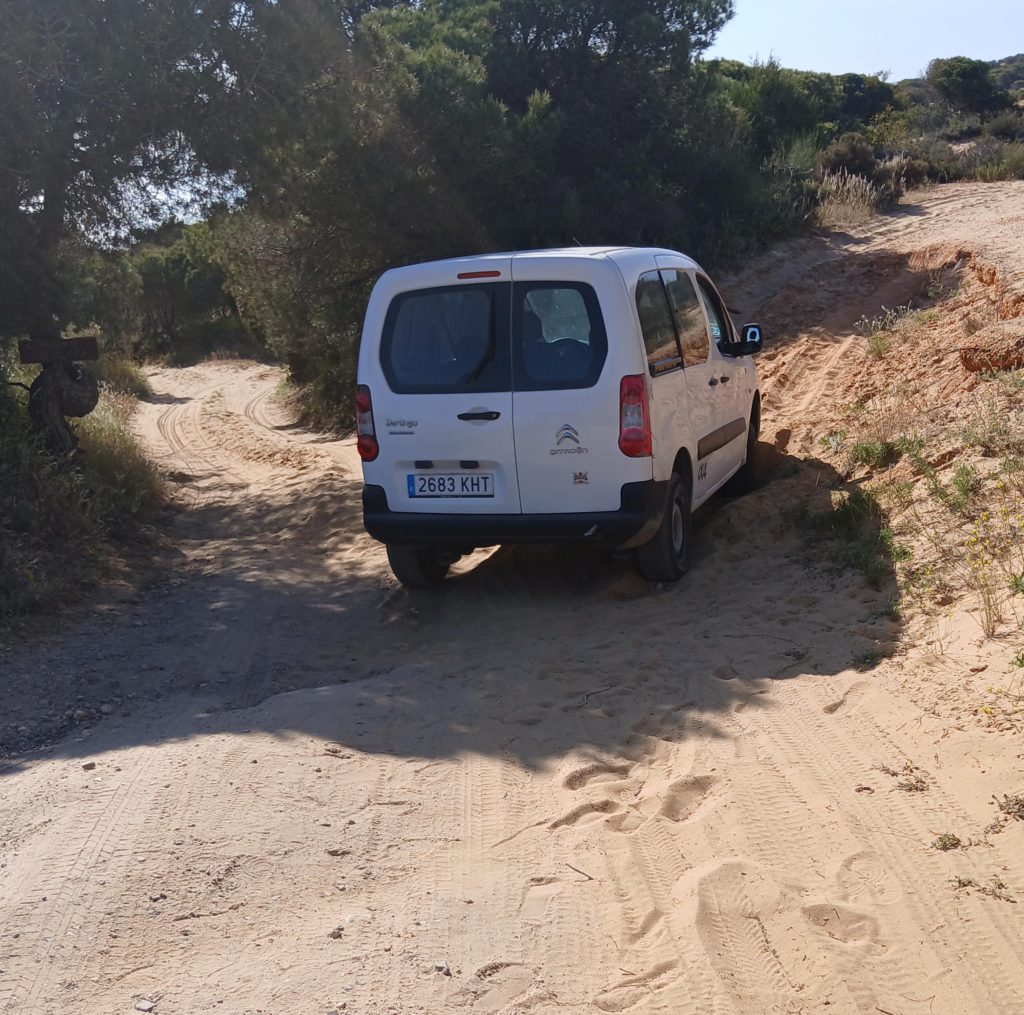
I have no choice but to sit near the car and hope someone will come along with enough muscle to help me out, but that doesn’t happen on this lonely dead end. Around 7 PM, I start to call for a tow truck. Unfortunately, the nearest towing service is about an hour away and they inform me that it will cost at least $200 to come out and give me one little tug. I’m not desperate enough for that, so I decide to sleep in place and see what the morning brings. I’ve used up what drinking water I have and I’m getting thirsty, so I trudge back to Matalascañas to buy some fluids. Power has returned early to this area, after only about 8 hours. Other parts of Spain will endure more than 24 hours of blackout. Nonetheless, everything in town remains closed except one small grocery. It’s easy to find because people with shopping bags are emanating from it in every direction. I stock up on beverages and start walking back to the car. On my way out of town, I happen to pass the Guardia Civil, the local police station. On impulse, I ring the bell and ask if there’s a local towing service of which I’m unaware. The officer says “No” and asks what my problem is. I explain that I’m stuck in sand just two meters from the pavement and tell him where. He says I should head back to the car. Halfway there, a police car picks me up and we return to the scene of the crime. Four burly police officers pile out and look over the situation. After about 3 minutes, they literally lift and push the front of the Berlingo while I drive in reverse. In seconds, I’m back on the pavement. I thank them profusely and they emphatically refuse any compensation. It’s a really excellent interaction with Spanish police.
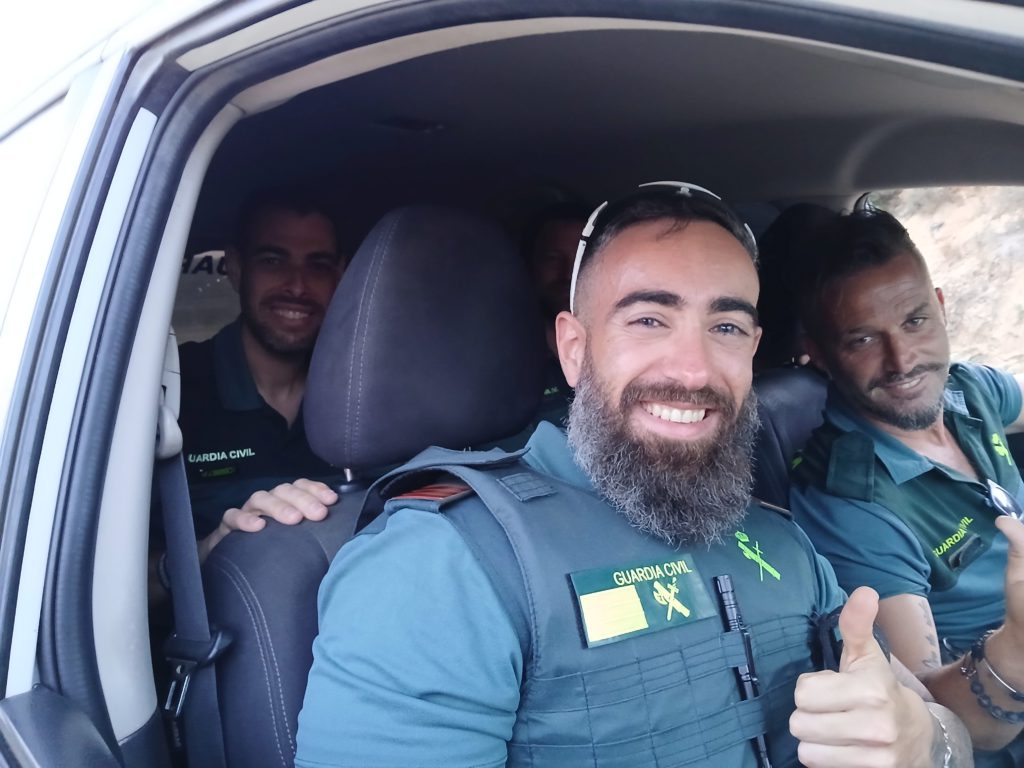
Now it’s 10 PM, after dark, and I make a second error in judgment. I’m due at another host in Granada, several hours away, tomorrow evening. My plan was to stay in a hostel in Seville before backtracking to the east tomorrow. Since I want to walk the nearby bird trails at first light, I decide to forego that and sleep where I am. I would have been better off at the hostel where I could sleep in a bed and then work during the day before my drive to Granada.
Sleeping in the Berlingo is definitely not comfortable, and I manage only because I can sleep virtually anywhere. Early Tuesday morning, I drive to the visitor center and walk the deserted trail out to the first bird blind. Disappointingly, what bird activity there is, is at quite a distance. Even with my telephoto, there’s not very much to see.
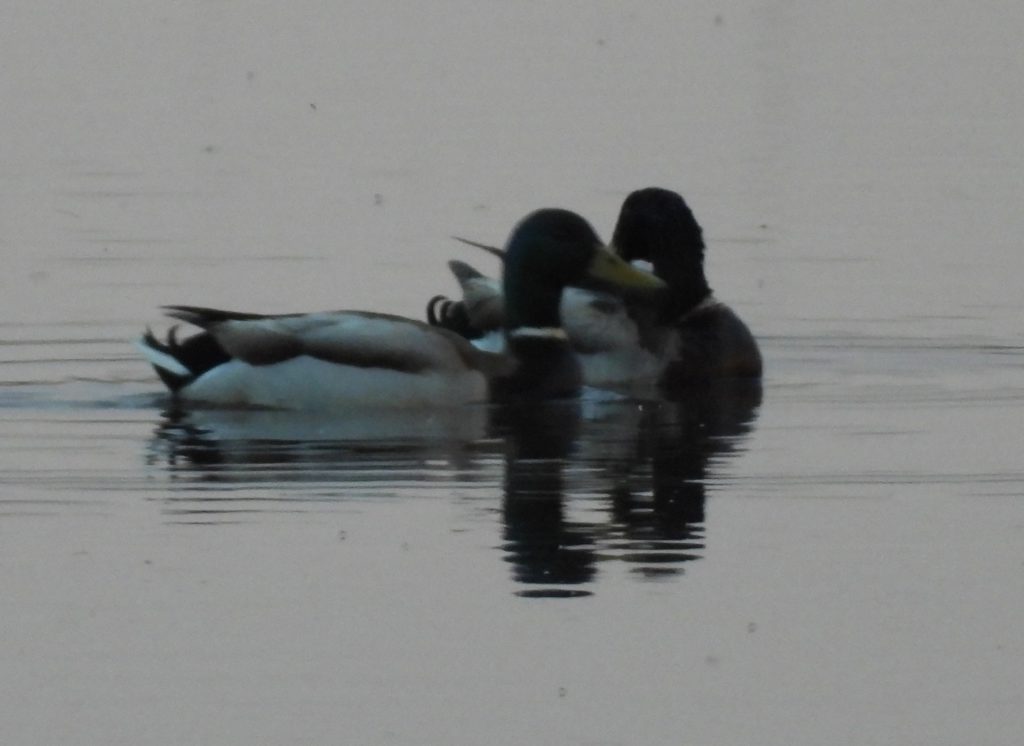
After about an hour, I give up and drive a short distance to the second public trail. This is a loop through forest and marsh to a “palace”, an opulent, former, private estate that is now a visitor center with exhibits that describe the local history.
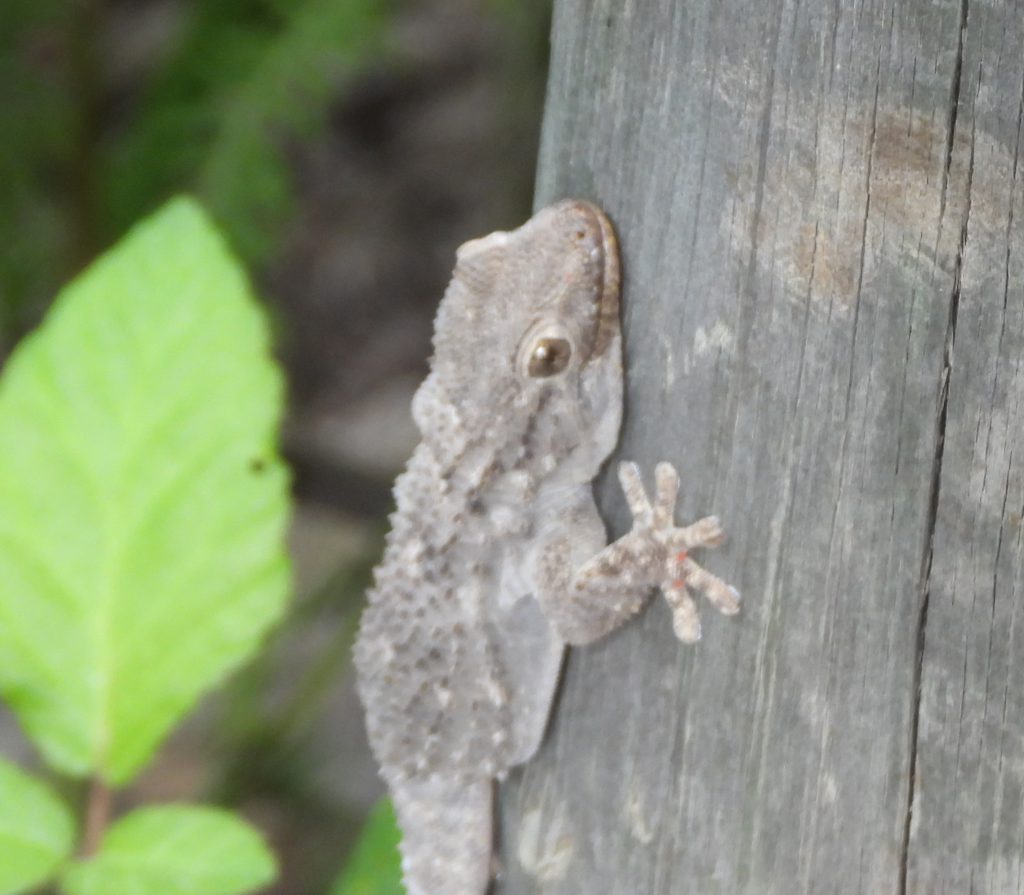
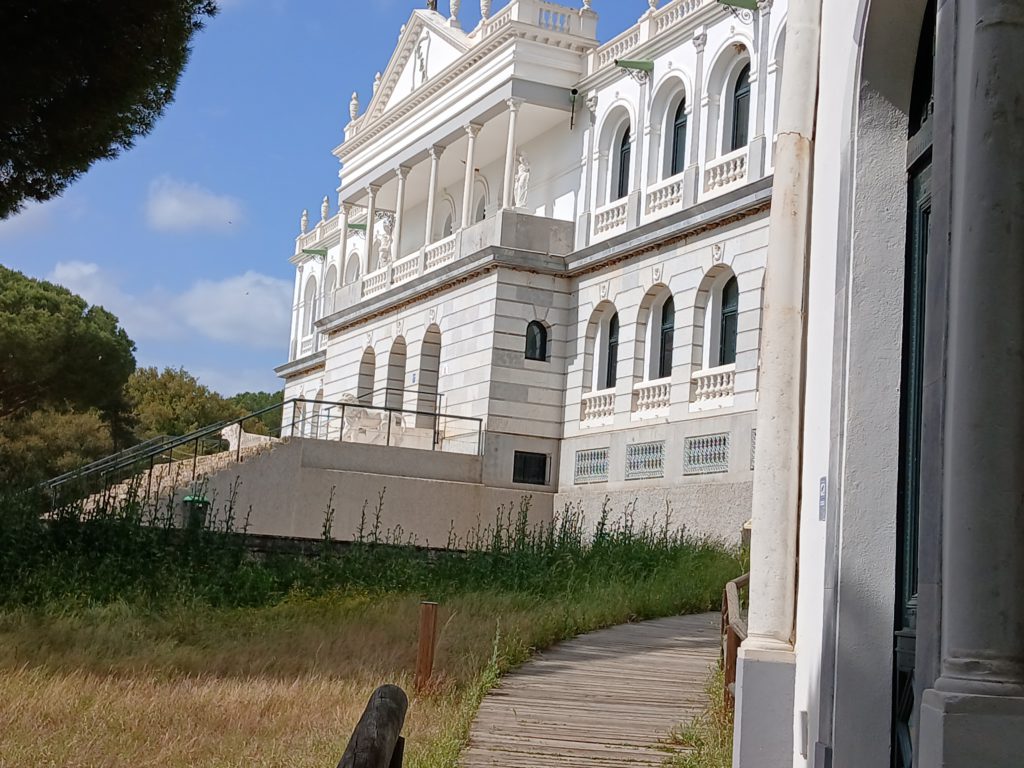
I learn quite a bit, but it fits into the almost inevitable historical pattern: a few rich people own and control everything and the common folk toil to survive and enrich the owners. In addition to working hard for little compensation, the peasants are prohibited from hunting on the estate because the owners reserve that right for themselves. Resources are devoted to catching and punishing poachers.
Returning to the car by noon, I amble my way eastward toward Granada, slowly because I’m not expected until 5 PM. I stop in shady spots for a couple of naps to supplement my uncomfortable night and. on schedule, I arrive in Monachil, a mountain village about 30 minutes south of the city.





